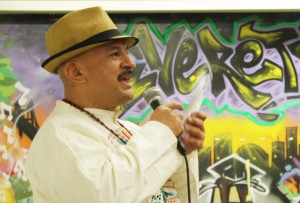“People ask me, ‘Roberto, why'd you invite me to another meeting?” meeting organizer Roberto Hernandez said. “Let me answer that question. You are here because you have called me in the past and told me about somebody who died. You've called me and told me we need money to pay for a coffin. That's why you're here today – because you've been affected.”
This isn’t the first time the coalition of residents and community-based organizations has come together to seek services for young people at risk of violence in the Mission. Hernandez said their previous plans were ignored in favor of a gang injunction that prevented 30 people suspected of gang affiliation from congregating in certain areas along 24th Street.
“We see that as a failure because, if you look at the last four years and how many young people have been killed on 24th Street, the numbers tell you,” he said.
But this time seems different. High profile San Francisco politicians, law enforcement officials and agency heads are attending the meetings, and they are listening to what the community has to say.
“The issue of violence and public safety cannot be resolved unless the community has a voice and a say in what that resolution is,” Mission District Supervisor David Campos said, adding that he is committed to investing city resources in the effort.
San Francisco Department of Public Health representative Charles Morimoto listened to the public health committee’s suggestions and took away a focus on cultural empowerment.
“Out of cultural pride can come individual pride,” he said, adding that a cultural vacuum runs the risk of being filled by “jail culture” and acceptance of violence.
“In public health, there’s safety in numbers,” Morimoto said. “Like what we did with tobacco. Smoking is not good for you, and we turned that around. Violence isn’t good for you either.”
San Francisco Police Department Capt. Robert Moser said he listened to the housing committee about the connection between a viable place to live and violent crime in the neighborhood. He said violent crimes in the Mission are down compared to this time last year, and arrests have increased substantially.
Communities have to organize themselves before they can expect much attention from City Hall, San Francisco Public Defender Jeff Adachi said at the meeting, and he issued a reminder that the Mission Peace Collaborative has competition.
“What we need is a solid alternative to gangs, to the love that gangs provide and the support that gangs provide,” he said. “We’ve got to compete with that.”
The Mission Peace Collaborative plans to meet again next month, but the date has yet to be decided.
